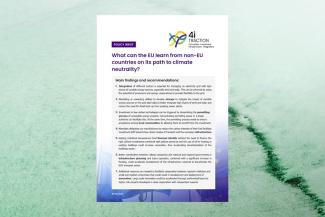
Citation:
4i-TRACTION (2022): What can the EU learn from non-EU countries on its path to climate neutrality? 4i-TRACTION Policy Brief. Climate Analytics, Berlin.
What can the EU learn from non-EU countries on its path to climate neutrality?
This policy brief summarises the results of 17 case studies of non-EU countries. It presents the main lessons and takeaways for the EU along the four challenges that define the 4i-TRACTION project: facilitating integration across sectors, shifting investments, rolling out infrastructure, and fostering innovation for a climate-neutral economy.
Main Messages
- Integration of different sectors is essential for managing an electricity grid with high shares of variable energy sources, especially wind and solar. This can be achieved by using the potential of prosumers and energy cooperatives to provide flexibility to the grid.
- Mandating or rewarding utilities to develop storage to mitigate the impact of variable energy sources on the grid also helps to better integrate high shares of wind and solar and reduce the need for fossil back-up from peaking power plants.
- Investment in low carbon technologies can be triggered by streamlining the permitting process of renewable energy projects. Concentrating permitting power in a single authority can facilitate this. At the same time, the permitting process needs to ensure acceptance among local communities by allowing them to benefit from the investment.
- Mandates obligating car manufacturers to reduce the carbon intensity of their fuel facilitate investment shift towards low carbon modes of transport and the necessary infrastructure
- Helping individual homeowners fund thermal retrofits without the need to finance the high upfront investments combined with policies aimed to end the use of oil for heating in existing buildings could increase renovation, thus accelerating decarbonisation of the buildings sector.
- Better coordination between railway companies and national and regional governments in infrastructure planning and trains operation, combined with a significant increase in funding, could accelerate development of the infrastructure required to decarbonise the EU’s transport sector.
- Additional resources are needed to facilitate cooperation between research institutes and small and medium enterprises that could result in development and deployment of innovation. Large scale innovation could be accelerated through preferential loans for higher-risk projects developed in close cooperation with independent experts.
The policy brief is available for download.